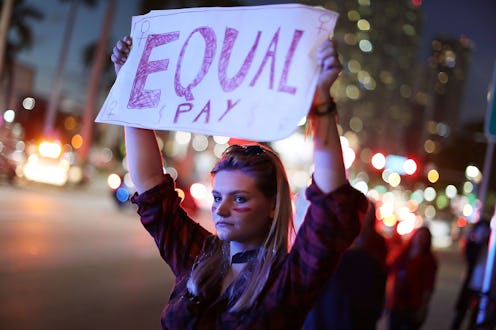News
The White House Dumped An Equal Pay Rule & This Lawsuit Wants It Back

On Wednesday, two groups sued the Trump administration over its rollback of a wage gap rule that was aimed at establishing more transparency around what men and women are paid. In September, President Trump's White House blocked the Obama-era rule that required large companies to report what they pay workers. By some estimates, if progress continues at the current rate, the gender pay gap won't close in the United States until 2119.
Democracy Forward, a nonpartisan nonprofit designed to take on the executive branch, filed a lawsuit on behalf of the National Women’s Law Center (NWLC) and the Labor Council for Latin American Advancement (LCLAA). The complaint argues that "a dearth of comparative salary and wage information may contribute to the persistence of race and gender pay gaps" because it undermines workers' ability to challenge discrimination. The lawsuit asked the court to order that the Trump administration allow the wage gap rule to go into effect.
The lawsuit makes the same argument equal pay advocates have been making for years: Women can't call out pay discrimination if they don't know how much their male co-workers are making. Women make 80 cents for every dollar their white male counterparts make, and the gap is even wider for women of color; black and Hispanic women make just 63 percent and 54 percent, respectively, of white men's wages. And at the end of the day, how does an employee prove she's making less than a male co-worker if the company she works for keeps its salary data private?
"Without measures in place that promote pay transparency, like the equal pay data collection, it can be challenging for workers to know whether they are being paid fairly and extremely difficult for them to have the necessary information to remedy existing pay disparities to close the wage gap," says Mónica Ramírez, LCLAA's deputy director, in a statement provided to Bustle.
Former President Obama's directive, which was supposed to into effect next year, would require companies with more than 100 employees to submit information on workers' pay, breaking it down by race, ethnicity, and gender. However, the Office of Management and Budget (OMB) announced in September that it was reviewing the rule and issued an immediate stay, meaning that the rule wouldn't go into effect in 2018. Neomi Rao, administrator of the OMB, said in a letter to the Equal Employment Opportunity Commission (EEOC) that her office was concerned parts of the order were "unnecessarily burdensome and do not adequately address privacy and confidentiality issues."
In the complaint filed this week, the NWLC claims that the lack of available data prohibits it from suing employers on behalf of workers who believe that they're being paid less because of their race or gender.
"Pay data is probative evidence needed to convince the EEOC to take action or to convince a court or jury of a claim’s merit," the complaint reads. "But in most cases, neither NWLC nor its clients can obtain that data directly from employers."
Democratic lawmakers also came out in support of the lawsuit, and Reps. Rosa DeLauro of Connecticut and Lois Frankel of Florida issued a joint statement calling the Trump administration's decision to roll back the rule an "illegal attack on equal pay, plain and simple." The two congresswomen sent a letter signed by more than 100 members of Congress to the OMB and EEOC in September voicing their opposition to the move, and they still want to see the equal pay rule put into effect. Frankel, chair of the Democratic Women’s Working Group, says in the statement:
It’s not enough to say men and women deserve equal pay for equal work. We need to fully enforce anti-discrimination laws, and this pay data would give us a critical tool to do so. The financial security of American families depends on it.
Notably, Ivanka Trump backed the administration's decision to nix the equal pay rule at the time.
"Ultimately, while I believe the intention was good and agree that pay transparency is important, the proposed policy would not yield the intended results," the first daughter said in a statement to The Wall Street Journal.
The Trump administration has not specified what policies it thinks would have better results, however, so the lawsuit's plaintiffs hope to force it to reinstate the equal pay rule.